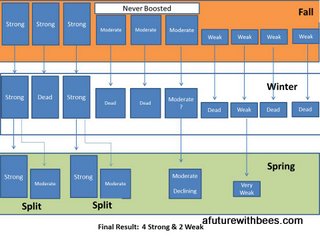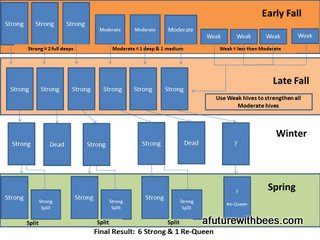![]()
There is an adage in beekeeping that goes "Take your winter losses in the fall".
It took me years to gain a strong understanding of this concept.
For years I tried to nurse weak colonies though the winter hoping for good results and more hives in the spring. All the while I was hurting my operation and causing bees to suffer unnecessarily. I would like to tell a tale of two apiaries/beekeepers.
Both apiaries have 10 hives in them:
- 3 are rated strong (they have 2 deeps filled with honey, pollen, brood, and a healthy population)
- 3 are rated moderate ( they have a deep and a medium filled)
- 4 are rated weak ( they have less then a full deep and a medium filled)
Scenario 1
This beekeeper chooses to feed the weak and moderate hives heavily and "hope" they make it though the winter. This beekeeper "doesn't want to kill a queen" or "lose a hive". Perfectly understandable sentiments, no one likes to do these things. But, this causes the loss of more bees and causes more suffering in the long run.
Winter:
- The strong hives do fine although 1 fails for reasons that are often impossible to determine.
- The 3 moderate hives struggle and 2 fail.
- The 4 weak hives never really had a chance. They didn't have the population to take advantage of the stores/feed or to keep adequately warm. So 3 of the 4 suffer and die (this is really a best scenario version. More likely, they all die early in January)
Spring:
In the spring this beekeeper has:
- 2 strong hives that can have excess frames pulled for making splits
- 1 moderate hive left, but it is weaker and will need to regain strength before it can be split
- All but 1 of the weak hives died and those resources are now lost. This hive didn't build up last year and there is no reason to expect it to perform better this year despite our hopes and good intentions. It is unlikely to produce more bees or any excess honey. As a matter of fact, the beekeeper will probably have to put resources into this hive just get it to survive.
So this beekeeper ends up with 2 strong hives, 2 splits, and 1 moderate hive that is iffy, and a loser hive, for a total of 5 hives (the loser doesn’t count). This beekeeper would be lucky to recoup her losses and go into next fall with 6-7 hives by making more late summer splits.
Scenario 2
This beekeeper chooses to combine the weak hives into the moderate hives boosting them into strong hives (assuming the hives are weak due to poor genetics/performance, not disease). She "takes her winter losses in the fall".
Winter
- The 6 strong hives do fine but 2 are lost, and one loses strength and comes into the spring as a moderate hive (4 hives total)
- The 3 strong hives can have excess frames pulled to create "splits"
- The moderate hive needs to regain strength. This beekeeper will re-queen with a queen cells raised in the split from the strongest hive. Re-queening from the strongest hive will upgrade the performance of this hive and provide positive genetic selection in the apiary.
So this beekeeper ends up with 3 strong hives, 3 splits, and a re-queened moderate hive that will now grow strong, for a total of 7 good hives. If she manages her splits well, and makes some late summer splits, this beekeeper should be able to go into next winter with 10-11 colonies.
Which beekeeper do you want to be? Which set of bees survived the best and suffered the least?
This far south, there is usually a lot of good weather in November to work hives. It is not too late to "take your losses in the fall".
I'm starting to prep for the winter, but as I've said, I don't want to do it too soon. After making the necessary combinations and making sure the hives are strong enough to over winter well, I will close the screened bottom and add a 1-2" rim/spacer on top. The rim has two small ventilation holes to control condensation and gives me room to add a sugar cake or pollen patty in late February. In late December or January, I might reduce the entrance, or I might not - it really isn't necessary.
I hope you have a lot of strong hives going into winter and don't have to make many hard choices and combinations. If you do have to make the these decisions,
I hope that sharing my mistakes and experiences will help you understand why these choices are necessary and will help the bees.

